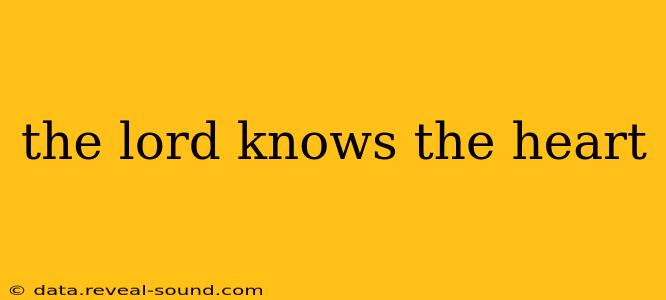The phrase "the Lord knows the heart" speaks to a fundamental tenet of many faiths: the belief in a divine being possessing complete knowledge, including the thoughts, intentions, and emotions hidden within the human heart. This concept, while offering comfort and accountability, also raises profound questions about free will, judgment, and the nature of divine understanding. This exploration delves into the theological and philosophical implications of this powerful statement, examining its meaning across different religious perspectives and its impact on our lived experience.
What Does "The Lord Knows the Heart" Actually Mean?
This phrase encapsulates the idea of divine omniscience – the belief that God possesses complete knowledge of all things, past, present, and future. It goes beyond simply knowing our actions; it implies a deep understanding of our motivations, the unspoken desires that drive our choices, and even the unexpressed emotions that shape our inner lives. This intimate knowledge isn't merely observational; it suggests a profound connection between the divine and the human.
How Does This Belief Impact Our Lives?
The belief that God knows our hearts can have a profound effect on how we live our lives. For some, it fosters a sense of accountability, encouraging ethical behavior and personal responsibility. Knowing that our actions and intentions are seen by a higher power can motivate us to strive for goodness and righteousness. Conversely, it can also bring feelings of vulnerability and fear of judgment. The weight of divine scrutiny can be both a source of comfort and a source of anxiety, depending on individual beliefs and experiences.
Does God's Knowledge of the Heart Imply Predestination?
This is a central theological debate. The concept of divine omniscience often raises the question of free will. If God already knows everything we will do, does that mean our choices are predetermined, and we are merely acting out a script already written? Many theologians argue that God's knowledge doesn't negate free will. Instead, it suggests a divine perspective that transcends the limitations of human understanding. God sees the entirety of time, but within that framework, human beings still retain the capacity for genuine choice.
Can We Hide Our True Selves From God?
The very essence of the phrase "the Lord knows the heart" suggests the impossibility of hiding our true selves from the divine. Our attempts at deception or self-justification are seen through, not because God is trying to catch us out, but because divine understanding surpasses any human façade. This isn't about divine judgment but rather about a complete and compassionate understanding of the human condition.
How Does This Concept Vary Across Different Religions?
While the core idea of a divine being with intimate knowledge of the human heart is present across many faiths, the specific interpretations and implications vary. In Christianity, this is often linked to concepts of grace, forgiveness, and redemption. In Islam, it emphasizes accountability and the importance of striving for righteousness. Other religions hold similar beliefs, albeit with diverse nuances in their theological frameworks.
What is the Role of Confession and Repentance?
The belief that God knows the heart often underlies the practices of confession and repentance in many religious traditions. These practices aren't about informing God of something He doesn't already know but about acknowledging our flaws, seeking forgiveness, and committing to personal transformation. The act of confession itself can be a powerful step towards healing and reconciliation, both with oneself and with the divine.
Conclusion: A Continuing Dialogue
The phrase "the Lord knows the heart" remains a powerful and complex concept, sparking ongoing theological and philosophical debate. Its meaning varies across religious traditions, yet its central idea – the intimate connection between the divine and the human – continues to resonate deeply with individuals seeking meaning and purpose in life. The belief offers both comfort and challenge, inspiring us to strive for greater self-awareness and ethical living while grappling with the profound mysteries of divine knowledge and human existence.
